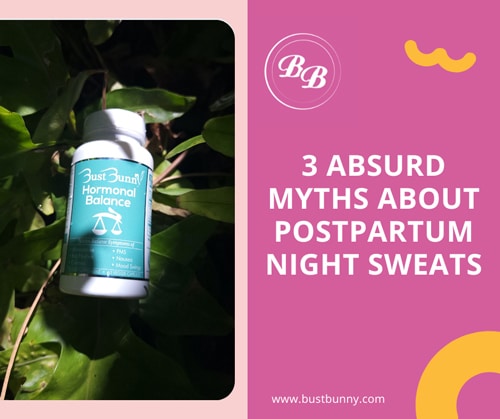Limited time offer!
JULY SALE, use code "JULY10" to get 10% OFF
If you’re a new mom who often startles awake, shivering in a pool of sweat, you’re not alone. Postpartum night sweats happen to about 30% of newly delivered mothers for varied lengths of time depending on how soon they restore their hormonal balance.
That said, it’s challenging to weed out the myths about postpartum night sweats from the facts about their causes, duration, and potential remedies.
We understand that you’ve got your hands full with parenting and need all the sleep you can get, minus night sweats. So, let’s lighten the load.
We want to debunk the myths surrounding postpartum night sweats and give you information to help you better weather those episodes and improve your quality of sleep.
We’ll shed light on:
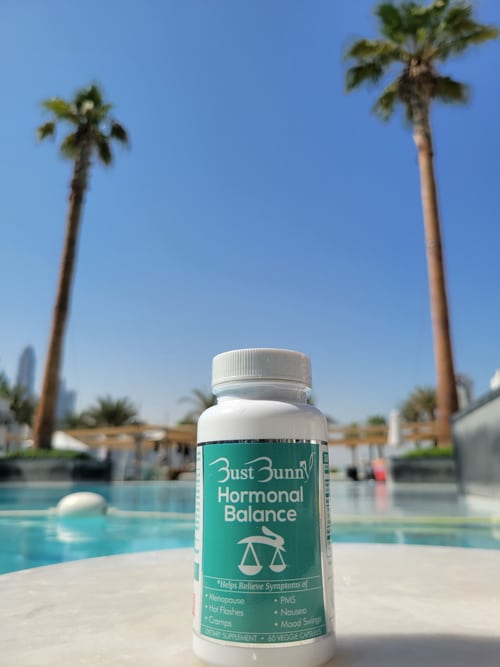
Moms’ forums and resources often focus on externals, such as keeping the bedroom temperature low or wearing light pajamas to ease night sweats. While these hacks help, they are superficial and center the solution to postpartum night sweats on incidental externals.
Many new moms still wake up drenched in sweat in the dead of winter. This is primarily because of the drastic change in hormone levels rather than any external causes.
During pregnancy, the levels of the reproductive hormones, estrogen and progesterone, are increased to support a healthy pregnancy.
However, after placenta delivery, estrogen and progesterone levels crash dramatically, setting off a domino effect across the hormonal system. In addition, prolactin, the hormone that enables you to produce milk, further suppresses postpartum estrogen levels.
While further studies are needed to fully understand this hormonal cascade, here’s what we know:
Our hormones are more like an orchestra than a solo player. Each hormone’s role feeds into the others. Consequently, an imbalance in one hormone derails the whole system.
Remember, it may take the body anywhere from a few weeks to a few months or even years to reset your hormones.
In the meantime, what can you do to remedy the night sweats?
“Slept comfortably with less night sweats and heat rash. I started having night sweats and couldn’t sleep at night. I knew I probably had to take some form of hormonal balance, so I gave this a try. It definitely helped! My night sweats don’t occur as often… I’m able to sleep, thank God.”
— Vivia, USA.
Expert Tip: There are other conditions that may cause night sweats, including:
To rule out the above conditions, see your doctor if besides hot flashes and night sweats you experience:
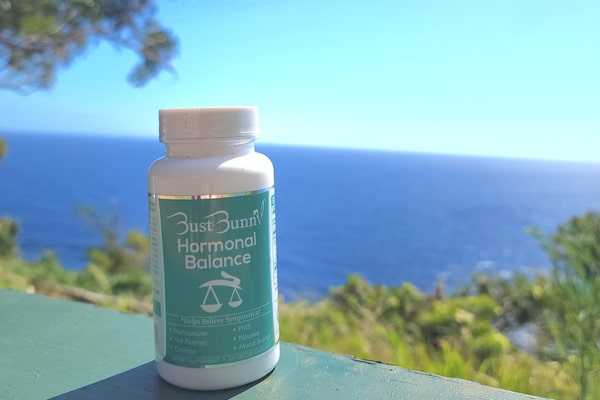
Six weeks post-delivery is the typical postpartum period, after which doctors expect hormonal fluctuations and symptoms such as night sweats to resolve themselves.
Postpartum night sweats can persist well beyond your first year after delivery. The reason: Hormonal imbalance, the primary cause of night sweating, can persist for years for many women whose bodies are unable to return to hormonal equilibrium.
Your body’s inability to revert to balanced hormonal levels may be due to medical conditions or lifestyle causes.
Aside from medical conditions, which your physician should test for and rule out, there are other aspects of your lifestyle potentially prolonging the imbalance and night sweats.
Let’s briefly look at some of these lifestyle-related causes:
So, what can you do to fix the hormonal imbalance and night sweats?
Before you reach for medication, here are simple ways to balance your hormones naturally and take back your nights:
“Goodbye hot flashes! No more night sweats, aka hot flashes! They have stopped since I started taking the Hormonal Balance.”
— Heather, USA.
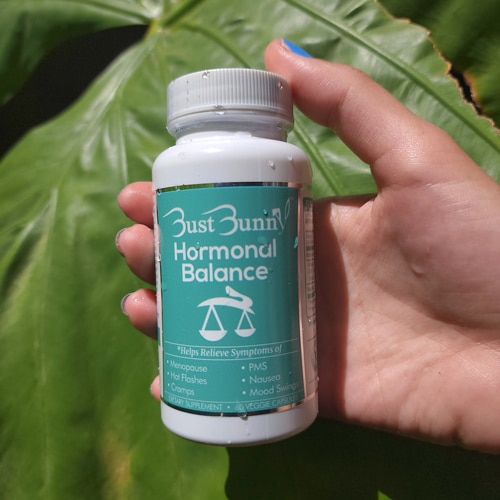
When the cause of night sweats is under discussion, invariably one of the knee-jerk answers is breastfeeding. It’s assumed that once you stop breastfeeding or wean the baby and reduce breast milk demand, night sweats will stop.
Prolactin, the hormone that controls milk production, is only a small part of the hormonal imbalance.
Therefore, breastfeeding isn’t a satisfactory reason for the moms whose night sweats persist after nine months, and sometimes well into the toddler years, long after their child transitions to food.
While prolactin suppresses estrogen, low estrogen levels after birth are the major driver of night sweats.
To avoid exacerbating your hormonal imbalance and night sweats:
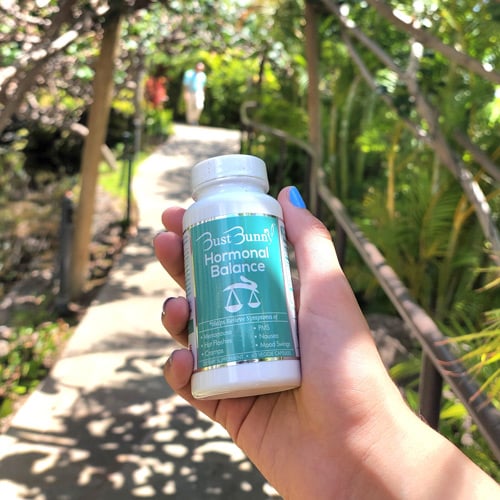
We’ve debunked the myths and looked at some of the lifestyle changes that can improve your hormonal balance.
That said, if you want to delve deeper into herbal remedies, the table below breaks down some herbal extracts to look out for in your supplements and their effects:
| Natural Herbal Remedy | Remedy Characteristic | Effect On Your Body |
| Shatavari | Contains phytoestrogen (plant-based substances that mimic estrogen) | Binds to estrogen receptors in the body, reducing the effect of estrogen deficiency |
| Vitamin E | Boosts progesterone and balances estrogen | Facilitates restful sleep and production of serotonin, key in balancing temperature |
| Ginger Root | Improves levels of estrogen and progesterone | Supports hormonal balance |
| Chamomile | Increases production of luteinizing hormone (LH) | LH triggers the production of more progesterone, which affects sleep and temperature control |
| Dong Quai (Angelica Sinensis) | Mimics estrogen | Binds to estrogen receptors in the body, supporting hormonal balance |
You’re not alone in suffering postpartum night sweats, as 30% of women experience them after delivery.
Remember that every mom’s body is different and external factors like temperature or breastfeeding duration are incidental to the duration and intensity of night sweats.
The key to managing postpartum night sweats is to tackle them from their root cause—hormonal imbalance.
Now that you know how crucial hormonal balance is, take back control of your nights with Hormonal Balance from Bust Bunny.
Packed with active herbal ingredients including maca, shatavari, vitamin E, ginger root, chamomile, and Angelica sinensis, the Hormonal Balance supplement helps relieve hot flashes and night sweats by restoring your body’s natural balance.
Share on Instagram:
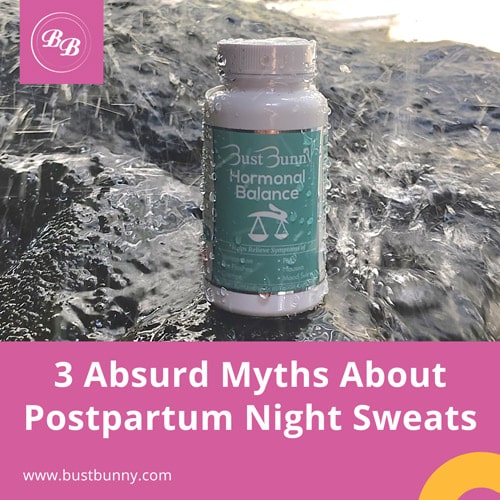
Share on Facebook:
